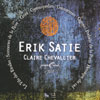Satie Piano Works
Chevallier gets to the root of Satie’s unique and much misunderstood music
View record and artist detailsRecord and Artist Details
Composer or Director: Erik Satie
Genre:
Instrumental
Label: Zig-Zag Territoires
Magazine Review Date: 11/2009
Media Format: CD or Download
Media Runtime: 0
Mastering:
Stereo
DDD
Catalogue Number: ZZT080901

Tracks:
| Composition | Artist Credit |
|---|---|
| (6) Gnossiennes, Movement: No. 1 (1890) |
Erik Satie, Composer
Claire Chevallier, Piano Erik Satie, Composer |
| (6) Gnossiennes, Movement: No. 2 (1890) |
Erik Satie, Composer
Claire Chevallier, Piano Erik Satie, Composer |
| (6) Gnossiennes, Movement: No. 3 (1890) |
Erik Satie, Composer
Claire Chevallier, Piano Erik Satie, Composer |
| (Le) Fils des étoiles, Movement: La vocation (Act 1) |
Erik Satie, Composer
Claire Chevallier, Piano Erik Satie, Composer |
| (Le) Fils des étoiles, Movement: L'initiation (Act 2) |
Erik Satie, Composer
Claire Chevallier, Piano Erik Satie, Composer |
| (Le) Fils des étoiles, Movement: L'incantation (Act 3) |
Erik Satie, Composer
Claire Chevallier, Piano Erik Satie, Composer |
| Prélude de la porte héroïque du ciel |
Erik Satie, Composer
Claire Chevallier, Piano Erik Satie, Composer |
| Sonneries de la Rose + Croix |
Erik Satie, Composer
Claire Chevallier, Piano Erik Satie, Composer |
| (3) Gymnopédies |
Erik Satie, Composer
Claire Chevallier, Piano Erik Satie, Composer |
| (4) Ogives |
Erik Satie, Composer
Claire Chevallier, Piano Erik Satie, Composer |
Author: Philip_Clark
The choice of instrument is a level of detail that normally leaves me yawning, but the peachy, resonant tone of Chevallier’s piano is the making of this revelatory disc. As she further explains, the exceptionally long dimensions of the instrument’s action demand “considerable adaptation in playing technique.” Did that re-think also oblige Chevallier to set tempi strikingly broader than the norm? She doesn’t elucidate. But this is Satie for those suspicious about his adoption as a “chill-out” composer. Here he sounds dangerous, subversive, crazed.
On the first of the Gymnopédies, Chevallier clocks in at 4'37" – a third longer than Aldo Ciccolini’s 3'05" on EMI. Her other strategy is to melt, only marginally, the borders between melody and accompaniment, raising the left-hand in the timbral mix. Satie’s familiar melodic contours now emerge from a warped distance; but the deliberate tempo and slightly brittle touch keep the thing itself – the unveiling riddle – alive and transforming.
Gnossiennes receives an equally bold treatment, before some lesser-known pieces. Chevallier’s spacious Le fils de étoiles stresses how Satie’s inside-out structure evolves from harmony that is forced to work against its customary function. Prélude de la porte héroïque du ciel, with incongruously positioned cadence points and resolution-resistant harmonies, is played entirely deadpan – composer, pianist, instrument determined to bring down the music from the inside.
Discover the world's largest classical music catalogue with Presto Music.

Gramophone Digital Club
- Digital Edition
- Digital Archive
- Reviews Database
- Full website access
From £8.75 / month
Subscribe
Gramophone Full Club
- Print Edition
- Digital Edition
- Digital Archive
- Reviews Database
- Full website access
From £11.00 / month
Subscribe
If you are a library, university or other organisation that would be interested in an institutional subscription to Gramophone please click here for further information.




